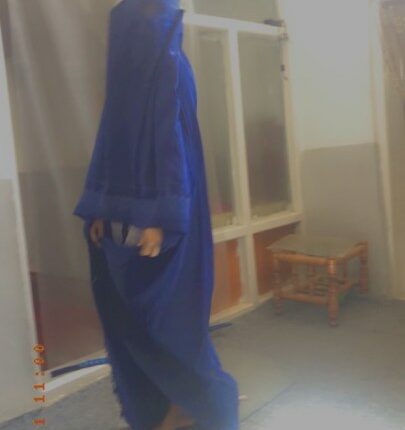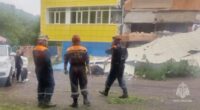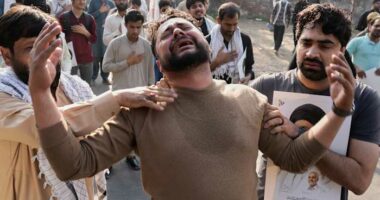Share this @internewscast.com
Editor’s note: reporter Diana Falzone has reported extensively on the sisters’ escape from Taliban-controlled Afghanistan and her involvement in getting them out of the country. Read her prior reporting on the topic here.
() In the summer of 2021, two Afghan sisters on the Taliban’s “kill list” were faced with a seemingly impossible mission: Escape the country after the Taliban took control. Shrouded in secrecy, they documented their journey, aided by an American Afghan war veteran.
Today, Sonia and Breshna Azatyar are both safely settled in different parts of Europe and are using their real names. They, along with retired Sergeant Major Gonzalo Lassally who operated the non-profit Tarjoman.org are sharing details of how they snuck out of Afghanistan nearly four years ago while the U.S. military was withdrawn, and the Taliban took over.
Life on the Taliban’s ‘kill list’
Kabul fell on August 15, 2021.
Sonia feared for herself and her family’s safety due to concerns that the terrorist group would kill people who were allied with the U.S. military.
“All the women and girls and men who have worked for the (U.S. military), or with them… they may not live anymore. So that was a clear reason to be scared,” she said.
As the country was being seized, Breshna was in the midst of an exam at the Afghanistan Institute of Higher Education, where she was studying international relations and diplomacy.
“I heard that people were shooting, saying so loudly that Taliban, they come, you have to leave university. And I was doing my exam at the same time,” Breshna, now 24 years old, said. “I called Sonia because she was the only person who came to my mind. ‘What should I do? Where should I go?’”
Breshna stayed hidden in her university classroom until Sonia, a journalist and interpreter for international journalists, found her. They asked a resident next door for a hijab to cover herself to escape, because she says the Taliban would have killed her on sight.

“I wasn’t able to sleep for a few days, and then I wasn’t able to even leave the house. I had that trauma in my head, like, ‘What if they see me outside my home, they will kill me,'” Breshna said.
As U.S. troops departed, the Taliban began “tracking down families” to find unwed daughters to take as fighters’ brides, Lassally said.
“A lot of people we were helping let us know or inform us that they’re being told that women that were at the age of being married, which to those men is particularly young, were going to be married off to the Taliban fighters, as a method of of thanks to what the Taliban fighters did by freeing the country,” he said.
Sonia caught one of the last flights out of Kabul on Aug. 25, 2021. The next day, a suicide bomb hit Kabul airport and flights were halted, leaving Breshna and her family stranded four days before the withdrawal deadline.
Rescuing US allies in Afghanistan
Lassally, who served two deployments in Afghanistan with the 10th Mountain Division, started the operation Tarjoman out of his home to help evacuate Afghan allies, such as interpreters he worked with during his deployment in the country.
The group’s mission was to move friends, interpreters and other people with connections to U.S. soldiers who were still in country. It also set up a non-profit to help with the needs of the people in the country.
“It turned into a 24 hour a day operation, an operation center that was built in my dining room with multiple TVs showing imagery and chats going back and forth with other veteran organizations and we started reaching out to local churches, and people in the local area to see if they wanted to volunteer with our makeshift operation center, and getting paperwork shuffled and started,” Lassally said.
The group was able to move people around from Taliban checkpoints in Kabul, using the metadata from pictures taken of those checkpoints.
“We were able to get resources like buses to transport people from Kabul to Islamabad or Mazar-i-Sharif, or places like that, to get people out of the unsafe areas where they were going and knocking door to door, ransacking the apartments or houses, looking for documents to find proof that people were working for Americans,” Lassally said.
Lassally and his team carefully executed an escape plan for Breshna, her mother, and brother. However, even with meticulous planning, the dangers were high for the student and her family.
“We had to carefully instruct people to hide documents a certain way or take pictures of them and get rid of them. Hide the cell phones. Have burkas on hand, have a good story going across the border.”
He said life was lived “second-to-second” as they crossed the border. Taliban guards looked for people hiding their faces, colored fingernails, or anything else deemed progressive to the new government.
Leaving Afghanistan was a scary experience for her and her family, leaving without a passport and visa, and being told not to use her cell phone.

“You have to hide you, and you have to hide your face. You have to wear something to cover all your face.” Breshna said. “It was clear that they just wanted to know who is inside the car… I heard a lot of stories in the border that some of the people were recognized by the Taliban, and they stopped the car, and they brought them, and they were lost on the way.”
Breshna and her family safely crossed into Pakistan on Sept. 27, 2021. They would stay there for several months before departing to live in Paris.
While both sisters escaped the Taliban, their older brother stayed behind in Kabul with his wife and five children, including a newborn daughter.
The 39-year-old former police officer was attacked by Taliban fighters on the street. He was seen wearing a T-shirt with a picture of Ahmed Shah Massoud, the assassinated guerrilla commander of the resistance against the Taliban. He died in the hospital on June 17.
Breshna said before her brother’s death, they had hoped the family could find peace in France.
“It was something that completely destroyed me, and it was not just only about myself, and I was living with my mother, and everything was new for me. Like, imagine if we would think, start life from zero, being in a new country, like learning the language, and forget all the trauma behind you, what you have been, what you have seen in Afghanistan, with all this stuff, and hearing such news, it was really too much for me, but we can’t do anything,” she said.
On the day she left Afghanistan, Breshna said, “I wasn’t even able to say goodbye to him.”
Navigating life after leaving Afghanistan
Sonia presently resides in Nijmegen in the Netherlands, and said she grapples with making connections in her new country as she lives with emotional wounds from her past.

“Here you have everything, and you can connect with people, but you’re all the time, afraid that, do they really understand me? Do they really feel what I have been through? Am I able to express? Am I able to be myself with all the injuries that I have in my soul? So now, I’m kind of trying to make a bridge for refugees who are living here,” she said.
Though grief lives in the sisters’ hearts, Breshna expressed gratitude for her new life away from Taliban-controlled Afghanistan.
“It’s way 1,000 times better than what we had, what I had in Afghanistan, like imagine having a life I can’t call it like life in Afghanistan. We were just surviving,” she said.
“Imagine not having freedom. You are not able to choose what you will be. You’re not able to choose how you will look, or anything, if we compare this life with how women are now in Afghanistan, in the last three years that’s not alive, not at all. It’s just surviving,” she continued.









